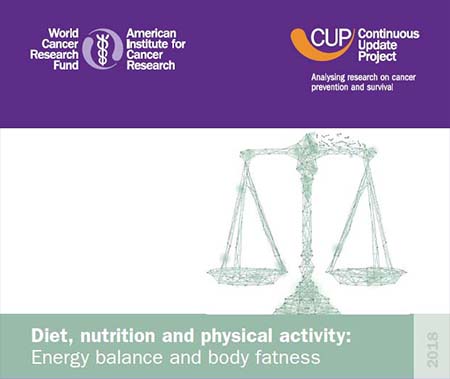For more than 30 years, the American Institute for Cancer Research (AICR) has been at the forefront of funding research and educating Americans about the link between lifestyle and cancer risk. We have made great progress thanks to the tremendous support from the scientific and health professional communities, as well as the general public who are invested in our research. However, our work is never finished, as awareness of the link between lifestyle and cancer risk is still too low among Americans.
AICR is working towards raising awareness by continuing to be heavily involved in influencing the policy decisions that affect how Americans eat. By using our collective voice, we ensure that government actions are conducive to helping people make informed choices to reduce their cancer risk and improve cancer survival.
The Dietary Guidelines Advisory Committee
We are fully engaged with the Dietary Guidelines Advisory Committee (DGAC), as the guidelines form the basis for all of the federal government’s food and nutrition policies and programs. The Dietary Guidelines for Americans inform everything from the nutrition standards for the school meals that 30 million students eat to the food packages provided to pregnant and postpartum women and young children who participate in the WIC program.
As described in our recent blog post, AICR has been involved in every stage of development for the 2020-2025 Dietary Guidelines for Americans. We have attended public meetings and listened to members deliberate decisions that shape their final recommendations to the federal government. We have submitted three sets of comments to the DGAC, two of which are focused on the DGAC’s research questions and methodology. We also provided oral comments on this topic during one of the public meetings. The third letter was submitted this past November and offered our comments on their protocols for reviewing studies concerning dietary patterns and cancer. In our final letter, we shared our research on foods and beverages that have a strong link to cancer, particularly whole grains, foods containing fiber, processed meat, red meat, dairy products and coffee.

We also described evidence from our 2018 Energy balance and body fatness report, concluding that a Mediterranean-type diet can lead to a decreased risk of weight gain, overweight and obesity.
As the process for reviewing evidence continues, AICR will remain engaged with the DGAC and offer our evidence-based research as a valuable resource to the committee. In 2020, AICR will attend two additional meetings hosted by the DGAC. We also plan to offer comments on additional research protocols, such as one examining the relationship between alcohol and cancer, and the DGAC’s conclusions and recommendations, to help ensure that they align with the current evidence regarding diet and cancer risk.
Increased Federal Funding for Cancer Research
Federal spending bills establish the level of funding for government agencies and programs. These bills must be passed by Congress on an annual basis to keep these areas of government operating. The Labor, Health and Human Services, Education, and Related Agencies (LHHS) appropriations bill provides funding for the National Institutes of Health (NIH). The NIH houses the National Cancer Institute (NCI), the largest cancer research funding entity in the United States. Thanks in part to research conducted through NCI, the rate of new cancer cases has declined each year from 2006-2015.
In order to continue this progress, and fund research on prevention of cancer, AICR has partnered with other cancer and health-focused organizations to advocate for an increase in funding for the NIH and NCI. In September, AICR participated in the American Association for Cancer Research’s Rally for Medical Research, which brought 300 national organizations to Capitol Hill to meet with members of Congress and their staff that decide the fate of cancer research funding. Attendees, including researchers, patients, caregivers, and advocates, shared powerful stories detailing why increased research funding is necessary for prevention and treatment of cancer and other debilitating diseases. For the 2020 fiscal year, AICR and partners asked Congress to increase funding for NIH by $2.5 billion and increase funding for NCI by at least a proportionate amount, bringing total funding to $41.6 billion to support life-saving research at NIH, including $6.522 billion for NCI.
This week, Congress overwhelmingly voted to pass and the President has signed into law two spending bills, one of which includes a $2.6 billion increase in funding for the NIH, with a $296 million increase for the NCI. The increase in funding for NIH is even higher than the amount requested by the medical research community. These bills will fund the federal government for the remainder of the fiscal year. AICR applauds the bipartisan action taken to pass this spending bill, which will help support life-saving research in cancer prevention and treatment.
The FDA’s Nutrition Innovation Strategy

Last year, we wrote about our involvement with the U.S. Food and Drug Administration (FDA)’s Nutrition Innovation Strategy, applauding the agency for its interest in disease prevention through nutrition. One key component of the Nutrition Innovation Strategy is updating standards of identity – mandatory requirements set by the government that must be met in order for a food to be labeled or marketed a certain way. In September, the FDA held a public meeting and requested input on changes to the standards across categories – “horizontal changes.” In our letter to the FDA, we described our support for this initiative and recommended that any changes to the standards of identity align with our Cancer Prevention Recommendations; for instance, changes should incentivize production of whole grain products and other nutrient-dense foods. We also recommended that the FDA make it easier to identify which products are mostly whole grain and therefore protective against a number of diseases, including colorectal cancer.
Another component of the Nutrition Innovation Strategy is implementing menu labeling in restaurants and other similar retailers, as well as updates to the Nutrition Facts label on food packages. AICR supports these policy changes that make it easier to manage calories and added sugar intake, which influence body weight, a leading cancer risk factor. AICR is working with the FDA to educate health professionals and consumers about how to use these new labels to make healthy choices. In January 2020, AICR will be holding a joint webinar with the FDA and releasing updated materials. Register for the webinar here and stay tuned for more info!
Looking Forward
Overall, the steps taken by government entities in 2019 are promising. Congress has passed a bill that will continue to fund ground-breaking research in the area of cancer prevention. The DGAC is embarking on a review of the evidence of the relationship between diet and health that is informed by AICR’s research. The FDA is implementing policies that make it easier for people to make healthy choices when food shopping and eating out. Altogether, these policies actively recognize the important role that nutrition plays in the development of cancer and promoting healthier eating, helping to curb America’s growing and unsettling health debt through prevention. In 2020, AICR will continue to advocate for federal policies that make living a cancer-protective lifestyle an easier and more inclusive goal.





